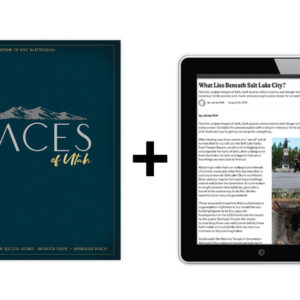by Richard Markosian
Most Goliaths know their bark is intimidating enough to silence the competition. Rich Shellene reluctantly agreed to discuss his dilemma of facing a frivolous lawsuit over the tagline for his business. He didn’t wish to have his business named or the nature of the lawsuit explained on the record.
Shellene owns a new local burger restaurant in downtown Salt Lake City. He says, “I don’t want to poke a sleeping dog.” While Shellene says it doesn’t look like he will need to fight in court, he is happy to have a reprieve from his legal battle against a giant opponent.

Tami Cromar states, despite how utterly ridiculous the cease-and-desist order she received from Pillsbury is — “I’ve given up, I’m going to change my name rather than fight… If I chose to fight I would have to close my doors because I would need to put every penny I have into legal fees.” Both Shellene and Cromar are facing the same battle with two giant adversaries: corporations who see their tiny businesses (by comparison) as a threat to their massive operations.
For the purpose of this story we can only say that the Pillsbury corporation is suing Cromar over her name ‘My Dough Girl.’ A theme that features WWII pin-up gals as names and images for her fresh gourmet cookies. If you can’t guess what the confusion is over, then you aren’t alone. Pillsbury’s once-popular little giggling spokesman -the dough boy- feels like the pin-up gals threaten his brand and confuse his image. It seems like the dough boy might be compensating due to his inadequacy in certain areas.
Truth be told, ‘My Dough Girl’ doesn’t plan on entering the frozen cookie dough market any time soon. Pillsbury’s dough boy cookies are full of preservatives, sugar and corn syrup, while Cromar’s ‘My Dough Girl’ cookies are made from all fresh, natural ingredients. Perhaps Pillsbury and the Dough Boy should let the free market determine who should win the battle over who has the best cookies.
What is the Dough Boy Afraid of?
Since the consciousness of many Americans is shifting from factory- made chemically-enhanced foods to fresh, locally grown, all natural ingredients, the dough boy might have a good reason to fear the much more lovely, fresh and beautiful cookies that Cromar offers. Fear of the competition is the only plausible reason for Pillsbury’s $2 billion empire to sue another business. But My Dough Girl had around $100,000 in sales last year, while Pillsbury’s sales were 20,000 times that.
 Nobody in their right mind would ever confuse the two brands. But with the way that copyright laws have been altered, Pillsbury can use their legal sway to intimidate nearly anyone who might choose to use the word ‘dough’ in their name. Cromar says her only recourse has been to hire a very expensive attorney. She says she will change her name to something that doesn’t use the word ‘dough’, ‘Betty’ or any proper noun or English Word.
Nobody in their right mind would ever confuse the two brands. But with the way that copyright laws have been altered, Pillsbury can use their legal sway to intimidate nearly anyone who might choose to use the word ‘dough’ in their name. Cromar says her only recourse has been to hire a very expensive attorney. She says she will change her name to something that doesn’t use the word ‘dough’, ‘Betty’ or any proper noun or English Word.
“Corporations now own the entire English dictionary,” says Cromar, “there is almost no way you could come up with a name that isn’t sue-worthy. Which is why so many new businesses use words that aren’t in the dictionary.” Cromer says that there are now companies that help new businesses find strange new words for their names to avoid the potential legal issues.
This is the reason we get more businesses like Google, Twitter, Microsoft or brands like Prozac. Dough Girl could probably be safe with Doz-Girlz but then she would need to change the image from WWII gals to bling wearing hip-hop artists. So, how did we get here? Where is justice and how can corporate empires now claim they own our language?
In an ideal free marketplace the judicial branch of government acts as an impartial referee calling fouls when unfairness occurs. But in the practice of trademark, intellectual property, and copyright laws, corporations have bought off the refs and using their power and money to tilt the playing field and rules in their favor.
Outwitting Goliath
According to Wasatch Beers owner Greg Schirf these business owners need not worry, he has used tactics in his David v. Goliath battles that have confused his adversary. In a nutshell he refuses to fight them at their own game.
Schirf received national attention when the Olympics came to Utah. For months Schirf advertised on a billboard announcing to the world that Wasatch Beers was the ‘Unofficial beer of the 2002 Olympic Winter Games.’ Schirf says that he received a cease-and-desist letter from the International Olympic Committee with a huge brief from a very intimidating team of lawyers representing the IOC. “They indicated they wanted to meet with the legal council representing Wasatch Beers. I said, ‘I’m representing myself.’ ” Despite having a lawyer readily available, Schirf went on to explain that by his tactic of self representation confused the IOC lawyers who didn’t know how to react. This practice is called ‘ambush marketing’.
Schirf also said that after receiving an extremely confusing letter written in ‘legal-eze’ he responded with an even more confusing letter written in an even more indiscernible legal jargon. Schirf found it a fun game to play and eventually the scandal surrounding the bribery of the IOC officials in choosing Salt Lake City overshadowed his battle. The law team became too busy with other matters and backed off. Wasatch’s billboard remained throughout the duration of the Olympics and he appreciated the international press his brand received. Wasatch’s merchandise and beer (especially ‘Polygamy Porter’) sold incredibly well to the international crowd.

Utah Stories asked Cromar what she thought of this tactic. She believed that unless she hired representation Pillsbury would find a judge to listen to the case and cause her to shut down. The question of these battles boils down to this: do these corporations really have a case in calling the ventures of Cromar ‘brand dilution’? The way the law is written heavily favors existing businesses.
In 1996, a new law outside of the standard ‘infringement’ known as ‘dilution’ has made it possible for corporations with strong brands to stake their claims on owning the English language to an even greater extent. The law states: “The term ‘dilution’ means the lessening of the capacity of a famous mark to identify and distinguish
-

Contributing Supporter
$10.00 / month Sign up now -

Donate
$5.00 – $50.00 Select options This product has multiple variants. The options may be chosen on the product page -

FACES of Utah Print + Digital
From: $8.00 / month Select options This product has multiple variants. The options may be chosen on the product page -

Full Access Membership
$5.00 / month Sign up now -

Print Only
$5.00 / month Sign up now -

Underwriter VIP Supporter
$20.00 / month Sign up now
Under the new law, ‘confusion’ is not required. Under this language it is a wonder that any new business could launch a new brand with the product they are producing in their name. Everyone knows Orville Redenbacher’s popcorn. If a company called Joe Schmo’s popcorn started up Orville would have a good case that Joe Schmo is ‘diluting’ the Redenbacher’s brand because they are using ‘pop corn’ in the brand name, which could ‘blur’ or ‘tarnish’ the Redenbacher’s brand. Would this really be the case? We looked up some cases where dilution was found and where it was not found.
In the first year after passage of the federal dilution act, many cases were brought to court including a case against the Utah Division of Travel Development by the Ringling Bros. And Barnum and Bailey Circus. The Ringling Bros. clowns must have brought this case forward because they wanted to sue over Utah’s license plates and catch phrase ‘the greatest snow on earth’ for infringing on the brand of Barnum as ‘the greatest show on earth.’ The court found that Ringling Bros. proved no dilution and that due to the fact that most Americans can easily discern between ‘snow’ and ‘show’, they had no case.
Ringling Bros. went on to sue several other businesses saying they had the ‘Greatest ___ on earth.’ They lost a similar case against a World Trade Center bar with the slogan ‘the greatest bar on earth.’ Again despite the language of the law judges tell corporate empires they can’t own the English language.
Similar Legal Battles Over Brand Dilution
- Office Max v. CarMax (a subsidiary of Circuit City) — Office Max says they own ‘max’ as a suffix or prefix of any word and CarMax is diluting their brand. Verdict: Office Max is not allowed to own ‘max’ and CarMax wins.
- Kegan v. Apple Computer, Inc — Kegan says they own the ‘___guide’ prefix. And Mac Guide and Apple Guide infringed upon their trademark. Verdict: Apple wins and everyone who wants to use ‘guide’ in their name is legit.
From these cases it would seem that despite the language of the law, judges aren’t allowing businesses to own English words. So the judges have saved the day.
One case that set the precedent for all others was Mead Data Central vs. Toyota. In this case the judge decided that there were six factors that went into play in order to determine if dilution was occurring these factors are:
a) the similarity of the marks, b) the similarity of the products covered by the marks, c) the sophistication of the consumers, d) the defendant’s predatory intent, e) the renown of the senior mark, and f) the renown of the junior mark.
Based on our research, if Tami Cromar went to court against Pillsbury under section (a) she would win section (b) is a close call, but fresh all natural cookies compared to frozen tube cookie dough is quite different (c) sophistication of consumers is too tough to call but the consumers would be much more likely to confuse Cromar’s brand with Betty Crocker than Pillsbury because the ladies she uses are pin up gals and Betty Crocker evokes an image of nostalgic cooking. (d) no question Cromar would win (e) Certainly the dough boy is huge and very well renown (f) Cromar would certainly win because currently she doesn’t sell any cookies outside of Utah.
Based on this only three out of six criteria could Pillsbury’s claim hold water. And the three that it does hold water on any judge who examined their products side-by-side would not determine Cromar is in violation.
We would like to see Cromar fight this good fight and put the dough boy in his place. A Google search demonstrates “dough boy” is now an iconic term associated with young American obesity. For too long corporations have been ever expanding their turf of ownership. Pillsbury has no right to claim they own the word ‘dough.’ §

